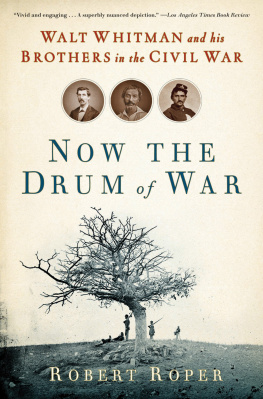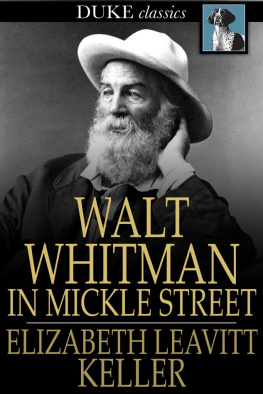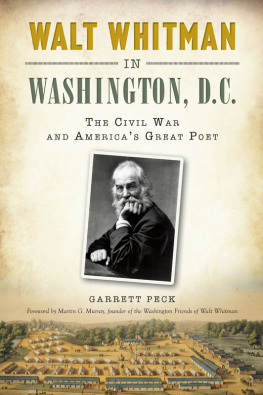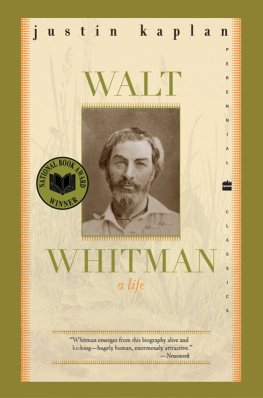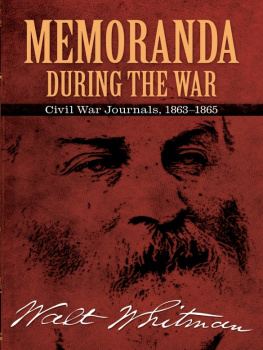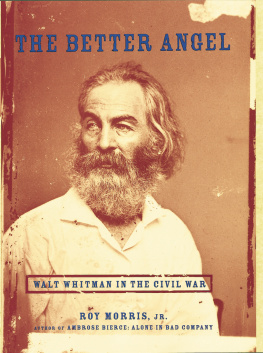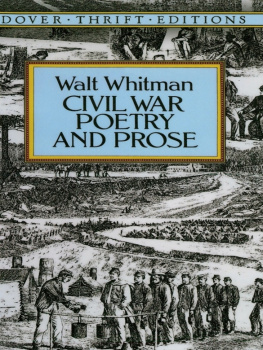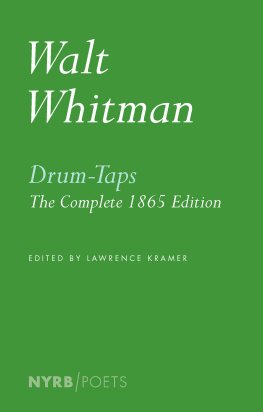Praise for Now the Drum of War
This is most definitely not the Walt Whitman you encountered in high school, or the Good Gray Poet you thought you understood in college. In fact, forget virtually everything you thought you knew about Whitman, because Robert Roper has some serious surprises in store for you.
Michael J. Bonafield, Minneapolis Star-Tribune
Roper is often a cinematic writer, deftly shifting point of view to reveal telling physical details as well as large psychological ones... But ultimately this book celebrates Whitman and his choice to stand so closely to the wreckage of war. Its a choice that resounds loudly in the present where war is still a grim fact, but where Americans tend to stand at greater distances, taking in only as much sanitized content as the news delivers, or even less.
Alyssa Haywoode, Boston Globe
At its heart, despite so much suffering and death, Ropers book is a moving, vivid exploration of love in many forms... Roper comes to narrative nonfiction... as an experienced, widely praised master. His craft shows in the way he takes care to evoke settings and scenes, giving us much more than a mere compilation of quotes from the Whitman familys writings. The result is a book that makes readers feel the force of what these people endured, and how their mutual love found expression in acts of bold, brave, honorable service.
Floyd Skloot, Philadelphia Inquirer
Walt Whitman once wrote that the real Civil War would never get in the books. The war gets into this book, however, with excerpts from letters of Walt and his brother George Whitman and other members of their family. As an officer in the 51st New York Infantry, George Whitman saw more action than most soldiers and wrote about it with vivid clarity, while Walt described his experiences as a volunteer nurse in army hospitals in his inimitable prose-poetry. Robert Roper has blended this rich material into a moving narrative.
James M. MacPherson, author of Tried by War: Abraham Lincoln as Commander in Chief and Battle Cry of Freedom
Robert Ropers Now the Drum of War is a delicious take on the Civil War: an intimate family biography of the Whitman family during this terrible contest told through the back and forth of letters. Meticulously researched, it is by turns fresh, illuminating, and touching.
Jay Winik, author of April 1865 and The Great Upheaval
In this groundbreaking study, Roper reveals the degree to which a poet famous for his depictions of the Civil War actually witnessed the carnage of clashing armies through the eyes of a younger brother, a daring Union officer... In the correspondence between the seasoned soldier and his family, Roper locates the conduit for raw material artistically transformed by the acclaimed bard... Behind the tangle of familial affections and sexual passions, readers discern the imaginative genius that wove very diverse strands into panoramic literature. Whitmans many admirers will find here a wealth of insights.
Bryce Christensen, Booklist (starred review)
Robert Roper, award-winning author of works of fiction and nonfiction, explores the brothers relationship and, by extension, the many wounded Civil War soldiers Walt visited in hospitals in the superb Nowthe Drum of War: Walt Whitman and His Brothers in the Civil War... Ropers evocative narrative impressively conveys the life and times of one of Americas greatest writers in a time of the nations greatest crisis.
Roger Bishop, BookPage
N OW
THE D RUM
OF
W AR
Walt Whitman and His Brothers
in the Civil War
ROBERT ROPER

Copyright 2008 by Robert Roper
All rights reserved. No part of this book may be used or reproduced in any manner
whatsoever without written permission from the publisher except in the case of brief quotations
embodied in critical articles or reviews. For information address Walker & Company,
175 Fifth Avenue, New York, New York 10010.
Published by Walker Publishing Company, Inc., New York
ART CREDITS
Courtesy of Trent Collection, Duke University: Library of Congress: photobucket.com: Ed Folsom collection. Courtesy of Walt Whitman House: Courtesy of the George Peabody Library, Johns Hopkins University: New York Public Library: Reproduced from The Brooklyn Water Works and Sewers: ADescriptive Memoir: Courtesy of Orchard House and the Louisa May Alcott Memorial Association: National Archives: Courtesy of Clara Barton National Historic Site, National Park Service: United States Army Military History Institute: genealogyandmore.com:
Bayley Collection, Ohio Wesleyan University:
All papers used by Walker & Company are natural, recyclable products made from wood grown
in well-managed forests. The manufacturing processes conform to the environmental regulations of the country of origin.
LIBRARY OF CONGRESS CATALOGING-IN-PUBLICATION DATA HAS BEEN APPLIED FOR.
eISBN: 9780802777591
Visit Walker & Companys Web site at www.walkerbooks.com
First published by Walker & Company in 2008
This paperback edition published in 2009
1 3 5 7 9 10 8 6 4 2
Typeset by Westchester Book Group
Printed in the United States of America by Quebecor World Fairfield
For Bob Spertus: eloquent friend
My ties and ballasts leave me....I travel....I sail....my elbows
rest in the sea-gaps,
I skirt the sierras....my palms cover continents,
I am afoot with my vision.
Table of Contents
T HE SCENT OF pennyroyal, crushed by soldiers shoes, remained intense as a false twilight came. A large force of Union troops had been stymied all day by rebels holding the high ground, and as the sun set early behind the wooded Maryland ridge, a shadowy time of error and anxiety arrived.
A Union brigade under Colonel Edward Ferrero, a former New York dancing instructor, spent the afternoon of September 14, 1862, in fair safety, downslope from the fighting in a cornfield. Three hundred yards away, some of the fiercest exchanges of musket fire yet heard in the Civil War rattled and clacked. Yet here in the cornfield, and in the nearby woods, Ferreros men lay around and waited, their only job the guarding of nearby artillery. It was the Lords day. Some Ohio troops had assembled that morning in an outdoor prayer session, led by a chaplain in a recitation out of Psalms: Bow down thy ear, O Lord, hear me: for I am poor and needy... In the day of my trouble I will call upon thee... For most, though, the day had little of a Sabbath character. One of Ferreros most battle-hardened units, the 51st New York Volunteers, grumbled as they waited: Orders had come to leave their knapsacks in the bushes, so as not to be encumbered when they entered the fight. At Second Bull Run two weeks before, they likewise had been made to leave their packs behind, and they had never recovered them.
Clean drawers, socks, tobacco, writing materials... the articles lost were much prized, and hard to replace on the march. The knapsack belonging to one young lieutenant, George Washington Whitman, of Brooklyn, probably contained a letter written by his mother, Louisa, on September 7 and another from his younger brother, Jeff, written September 8. Whitman treasured letters from home and begged for them with a frank desperation (Mother why the deuce dont some of you write to a fellow). He confessed to intense bouts of homesickness that made him think quite strange. Given the uncertainties of mail delivery to soldiers on the march, he understood that more letters were probably being written than he received, yet his fierce longing led him to fantasize about his family back in Brooklyn (ile bet now, that Mother is makeing pies... Mat is putting up shirt bosoms by the deuce... Sis is down stairs helping Mother mix the dough, Walt is up stairs writing, Jeff is down at the Office, Jess is pealing Potatoes for dinner, and Tobias has gone down cellar for a scuttle of coal).

